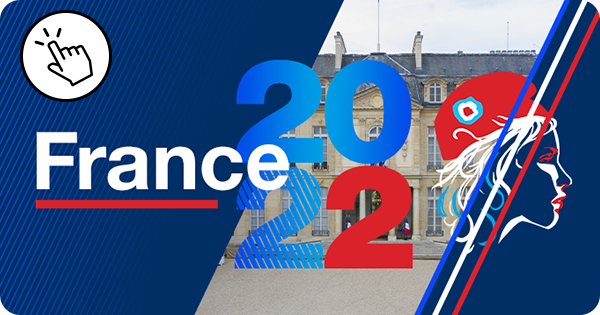Issued on:
While most countries rely on exit polls to declare elections winners, at the risk of jumping the gun, pollsters in France base their estimates on actual ballots counted – a system made possible by the staggered closure of polling stations across the country.
French voters head to the polls on Sunday to elect their next president in a rematch of the 2017 duel pitting Emmanuel Macron against Marine Le Pen. Projections and preliminary results won’t be known until after the last polling stations close at 8pm. But in what has become a familiar ritual, social media networks will start buzzing hours earlier with rumours of Belgian or Swiss polls claiming to predict the outcome of the election.
Such polls are not only strictly banned in France. They are also often wrong. It was the case again two weeks ago, during the first round of voting, when the rumours spoke of a tie between Macron and Le Pen (it later turned out that the incumbent was four points ahead).

At midnight on Friday, France enters a period of “electoral silence” during which French media are barred from quoting candidates or publishing opinion polls to ensure they don’t unduly influence voters. These rules also apply to candidates and their teams, who are strictly barred from campaigning in the last 44 hours before voting ends on Sunday.
On election day, polling stations in mainland France close at 7pm in most places and at 8pm in the larger cities including Paris. That one-hour lag, which used to be two hours in past elections, is crucial to pollsters who are expected to crunch the numbers and project a winner in time for the 8pm gong.
Unlike in most other democracies, where those projections are based on exit polls, French pollsters base their estimates on ballots that have actually been counted. Those estimates are updated throughout the evening as the vote count progresses.
‘They use interviews, we use ballots’
“The main difference with an exit poll is that instead of asking people outside the polling station how they voted, we look straight at their ballots,” says Mathieu Doiret of the Ipsos polling institute, FRANCE 24’s partner for the presidential election. “This means we have to wait for the first polling stations to close at 7pm, whereas exit polls can be worked on throughout the day.”

Like other pollsters, Ipsos relies on feedback from hundreds of polling stations scattered across France. The sample is chosen to ensure it is representative of the diversity of French constituencies while also matching the overall result of the last presidential election, which is used as a benchmark.
The idea is not so much to find areas where voting patterns mirror the rest of the country, but rather to have polling stations that are indicative of trends – for instance, to see if bastions of a given candidate turn out in large numbers or swing one way or another – and then come up with the broadest possible picture.
“British pollsters also pick a representative sample of polling stations and compare results with past elections in order to establish their projections,” says Doiret, whose institute also carries out surveys in the UK. “The only difference is the primary material: they use interviews, we use ballots.”
Relying on actual vote counts rather than interviews presents some advantages, says Doiret, noting that voters may not want to tell interviewers what ballot they cast.
“We also use exit polls in France, for instance to evaluate each candidate’s level of support by age group or profession,” he says. “But exit polls tend to be slightly less accurate, because people can refuse to answer our questions whereas they can’t refuse to have their ballots counted.”
100% record
France has used the same voting system for generations, requiring voters to cast paper ballots in person or by proxy and then counting them by hand. In polling stations sampled by Ipsos and its peers, an official calls the pollster after every 100 ballots counted to report the results. Using special software, the data is then compared with figures from past elections to elaborate projections.

The system has allowed pollsters to predict the outcome of all recent elections – including the wafer-thin margin that allowed far-right leader Jean-Marie Le Pen to edge out the Socialists’ Lionel Jospin in a shock first-round result in 2002.
>> On this day in 2002: Doomed Socialist favourite laughs off threat of Le Pen in presidential final
“We are yet to see pollsters unable to declare a winner, or the second-round finalists, at 8pm,” says Doiret. “Only once was there some confusion, in 1974 [Valéry Giscard d’Estaing won that race by just 400,000 votes, the narrowest margin yet]. But with today’s expertise and technical capabilities, we would have had no such difficulty.”
Still, the one-hour lag between the time polling stations close in rural areas and the larger cities – and on which pollsters depend to calculate their projections – means a surprise cannot be ruled out. It almost happened after the first round this year as a surge in support for third-man Jean-Luc Mélenchon in urban constituencies saw pollsters rush to adjust their projections after 8pm, bringing him very close to Le Pen’s score.
“Things can get tricky when candidates do significantly better than in past elections in a certain type of constituency,” Doiret explains. “In Mélenchon’s case, his support in rural areas was largely unchanged from 2017, whereas it surged in some urban areas. By definition, you can only find that out after 8pm when those polling stations have started reporting their results.”
"Exit" - Google News
April 24, 2022 at 02:18PM
https://ift.tt/g5ei3WP
Not just exit polls: Why French election projections are almost always correct - FRANCE 24 English
"Exit" - Google News
https://ift.tt/VF0UKH1
https://ift.tt/xy93WwZ
Bagikan Berita Ini














0 Response to "Not just exit polls: Why French election projections are almost always correct - FRANCE 24 English"
Post a Comment